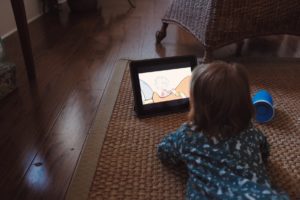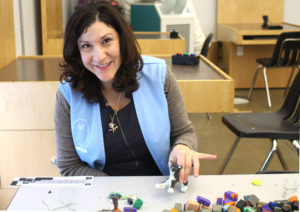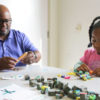![Make Ordinary TV Shows Extraordinary with Open-Ended Questions What is it like to be a pig? What makes someone a superhero? Is a hotdog a sandwich? As parents, we struggle to feel good about our kids’ screen time. We try to offer educational games and shows and hope that our kids will enjoy them. Common Sense Media has a wonderful list of programs […]](https://creativity.org/wp-content/uploads/2020/03/IMG_4950.jpg)
What is it like to be a pig? What makes someone a superhero? Is a hotdog a sandwich?

As parents, we struggle to feel good about our kids’ screen time.
We try to offer educational games and shows and hope that our kids will enjoy them. Common Sense Media has a wonderful list of programs that weave in various amounts STEM, social-emotional content, reading lessons, history, culture, cooking, and other forms of enrichment. But even the most recommended shows, like Daniel Tiger’s Neighborhood, have been shown to be effective only if parents discuss them with their kids. And anyway, our kids still beg for the shows and games that were designed mostly for entertainment, not education. We find ourselves giving in, and allowing these ‘treats’ as a break from the healthy stuff.
If you have time to watch TV with your kids, or get a synopsis, you’ll find plenty of things to talk about that are interesting for both of you. But too often, we are mostly in the dark about our kids’ media. We might restrict them to PBS Kids or Disney+ or Khan Academy Kids, and we might know the names of some of their favorite shows, but we usually know little more.
When catching up with your kids over a meal or on a walk, try asking some of these questions. Don’t play teacher and treat this as an assignment or quiz –many of these can open up long, fun conversations that connect parents and kids together, deeply, as human beings:
PLOT QUESTIONS
Did you watch any TV shows today? What was one of your favorites?
-
- Maybe they are really into Peppa Pig, and saw an episode about swimming. Maybe they love Steven Universe, and saw an episode about going back in time to fix mistakes.
Who were the most interesting characters?
-
- Try to get protagonists (‘heroes’) and antagonists (‘bad guys’), if any.
What was an interesting challenge/problem in the show? What was interesting about it?
-
- This might be the main challenge, or just one that your kids connected with.
What does the show make you wonder about?
-
- This can be anything. Maybe the Peppa Pig episode makes them wonder why water feels colder than the air outside. Maybe the Steven Universe show makes them wonder if time travel is possible. Come up with questions together and choose one to discuss.
PERSPECTIVE QUESTIONS
Think of an interesting character from the show. What do you think it was like for them in that situation?
-
- This can be about sensations, emotions, or beliefs.
How would you have felt in that situation? Why?
-
- Discuss how others might feel in that situation as well.
Think of some other characters (maybe antagonists or ‘bad guys’). How do you think they felt? Why?
-
- It can be hard to sympathize with secondary characters, especially ‘bad guys’.
Did anybody in the show believe something that wasn’t true?
-
- Maybe Peppa’s little brother, George Pig, thought the pool would be cold.
What would you have wanted to know if you were in that situation?
-
- Maybe a decision relies on information the characters or the viewers didn’t have.
Is there anything you would NOT have wanted to know?
-
- This is a question we rarely ask. This can open us to consider other situations where we might or might not want to know something.
Can we ever really know what an experience is like for someone else?
-
- This is a big philosophical question that has endured for millennia. For example: Can we know what strawberries taste like to other people? To other animals? How about to aliens or robots?
WHAT-IF QUESTIONS
What if the ending were different? What if the beginning, or the middle were different?
-
- Suggest alternatives if you can.
What would have made the show more interesting?
-
- What would have made the show funnier?
What if the characters were different (maybe from another show)?
-
- You could get really wacky and ask things like: What if the characters were made of chocolate?
What if the events happened in a different place? What if they happened in your house/town/class?
What other what-ifs would you like to explore?
-
- Getting in the habit of asking what-ifs is a key for higher-level cognition.
GOOD IDEA / BAD IDEA QUESTIONS
What did the characters do? Was it a good idea or a bad idea for them to do those things?
-
- You can then ask more generally if it’s always good or bad to do such things.
What were some of the rules in the world of the story? Are those rules good to have or bad rules to have?
-
- These can be laws of nature (like gravity, or cause-and-effect) or social rules/conventions that the characters are expected to follow. Suggest alternatives and ask if those would be a good idea or a bad idea.
What was assumed in the world of the story? Are those assumptions good to have or bad to have?
-
- These can be assumptions that the characters were making (e.g., that pool water is always cold) or assumptions that the author and viewer have in the background (e.g., that time travel is possible).
What other ‘good idea / bad idea’ questions are you wondering about?
-
- Come up with questions together and choose one to discuss.
CATEGORY QUESTIONS
What kinds of animals/people were in the show?
-
- For example, Peppa Pig has pigs and other animals. Steven Universe has people who are guardians of the universe.
What makes something/someone belong to that category?
- For example, What do you think makes something a pig?, Or, What do you think makes someone a guardian of the universe?
Does it have to have each of those features to belong to the category?
-
- For example, if they say “Pigs are pink, have a curly tail, and they snort”, ask: Can something be a pig and not be pink? Can something be pink, have a curly tail, and snort, and not be a pig?
What other kinds of objects or substances were there in the show?
You can go through the questions above with any category of thing or stuff. Philosophers puzzle about the necessary and sufficient features of all kinds of things: water, fruit, life, matter, personhood, happiness, knowledge … even holes, and sandwiches! We take these categories for granted, but when we look closely we find them quite confusing! Does a straw have one hole or two? Is a hotdog a sandwich?
These questions are inspired by the Philosophy for Children movement that started in the 1970s, using children’s content to stimulate philosophical inquiry. You can read about the movement at PLATO. If you’d like to find out about Philosophy for Children programs in the Bay Area, visit The Paradox Lab.

About the Author: Iris Oved received her doctorate in Philosophy from Rutgers University in 2009, with a dissertation on Concept Acquisition. She then spent 2 years as an NSF postdoctoral fellow in Machine Learning at the University of Arizona, followed by 4 years of postdoctoral research in Developmental Psychology at UC San Diego and UC Berkeley. Along the way, she founded the Paradox Lab to share with kids the joys of inquiry and help develop their higher-level thinking skills. She is now based in San Francisco and has been an Education Volunteer for Children’s Creativity Museum. For more info, see www.paradoxlab.org.




Comments (3)
Robert Oved
Well thought out. This type of format will help engage in meaningful conversations. Everyone is too engaged in screen time. This will help get some dialogue going and help with creative and critical thinking.
Erin B
This is so adorable! I find myself getting stuck sometimes and not being able to ask kids about the stories, especially if I don’t know the story myself. These questions seem so rich, and easier for kids to answer than my usual, “What did you like about it?” I really want to have these conversations with kids!!!
Erin B
This is so adorable! I find myself getting stuck sometimes and not being able to ask kids about the stories, especially if I don’t know the story myself. These questions seem so rich, and easier for kids to answer than my usual, “What did you like about it?” I really want to have these conversations with kids!!!